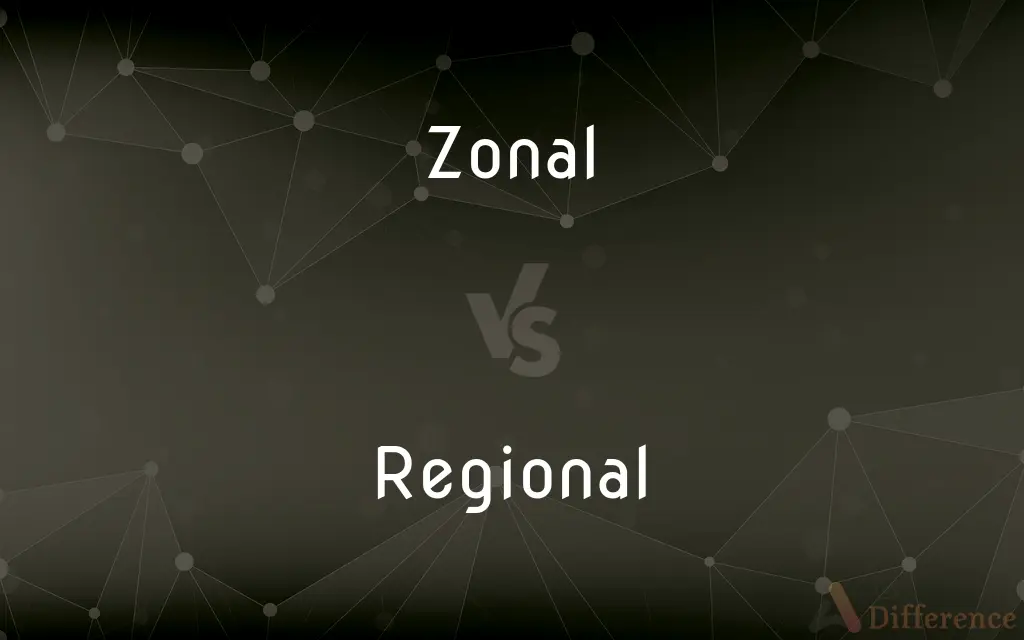Zonal vs. Regional — What's the Difference?
By Fiza Rafique & Urooj Arif — Updated on March 19, 2024
Zonal refers to divisions based on zones, often with specific characteristics, while regional pertains to broader areas defined by natural, administrative, or cultural boundaries.

Difference Between Zonal and Regional
Table of Contents
ADVERTISEMENT
Key Differences
Zonal divisions are typically based on defined zones within a larger area, which might be determined by climate, geography, administrative decisions, or specific purposes. These zones are often uniform in certain aspects and are used for planning, management, or classification. Regional, however, refers to a larger segment of territory that is identified by distinct natural, administrative, or cultural characteristics, encompassing a wider variety of features within its boundaries.
In the context of climate and environment, zonal classifications might refer to specific latitudinal bands that experience similar weather patterns, such as tropical, temperate, or polar zones. Regional classifications would focus on broader areas that share a common climate, but can also include variations due to topography, vegetation, and human influence, like the Pacific Northwest region or the Sahara Desert.
When it comes to sports or competitions, zonal refers to groupings or divisions within a larger competition framework, often used to manage teams or participants based on geographical proximity or level. Regional competitions, on the other hand, usually represent a broader area, encompassing several zones, and may serve as qualifiers for national or international levels.
In urban planning or real estate, zonal regulations might dictate land use, building codes, or development standards within specific zones of a city or area, such as residential, commercial, or industrial zones. Regional planning, conversely, looks at the broader landscape, considering transportation networks, economic development, and environmental protection across multiple zones or municipalities.
Zonal systems are often used in transportation, where fares, routes, or services are organized by specific zones to streamline operations and pricing. Regional transportation planning takes a wider view, integrating various zonal systems and modes of transportation to improve connectivity and efficiency across a larger area, often spanning several cities or counties.
ADVERTISEMENT
Comparison Chart
Definition
Divisions based on specific characteristics
Pertains to areas defined by broader characteristics
Use in Climate
Latitudinal bands with similar weather
Broader areas with common climate and variations
Sports/Competitions
Groupings within a framework
Broader area encompassing several zones
Urban Planning
Regulations for specific city zones
Planning across multiple zones or municipalities
Transportation
Organized by zones for operations
Integrates various zonal systems across a larger area
Compare with Definitions
Zonal
Used in organizing competitions.
The tournament's initial rounds were organized on a zonal basis.
Regional
Integrating different zones or systems.
The regional transit authority oversees bus and rail services across the county.
Zonal
Division within a larger system.
The transportation authority introduced zonal fares to simplify ticket pricing.
Regional
Broader area encompassing various characteristics.
The regional climate action plan addresses several municipalities.
Zonal
Pertaining to or arranged by zones.
The city implemented zonal parking restrictions to manage traffic.
Regional
Planning or development over a wide area.
Regional urban planning initiatives aim to connect cities and towns efficiently.
Zonal
Specific to a climatic zone.
Zonal vegetation maps help gardeners choose the right plants.
Regional
Pertaining to a specific region.
Regional cuisine reflects the traditions and ingredients of the area.
Zonal
Relating to zoning laws.
Zonal regulations determine what types of buildings can be constructed in each area.
Regional
Used in broader competitions or qualifications.
The team won the regional championships and advanced to nationals.
Zonal
An area or a region distinguished from adjacent parts by a distinctive feature or characteristic.
Regional
Of or relating to a large geographic region.
Zonal
A section of an area or territory established for a specific purpose, as a section of a city restricted to a particular type of building, enterprise, or activity
A residential zone.
Regional
Of or relating to a particular region or district.
Zonal
An area of a given radius within which a uniform rate is charged, as for transportation or shipping.
Regional
Of or affecting a region of the body
Regional pain.
Zonal
Any of the five regions of the surface of the earth that are loosely divided according to prevailing climate and latitude, including the tropics, the North and South Temperate Zones, and the North and South Polar Regions.
Regional
Of or characteristic of a form of a language that is distributed in identifiable geographic areas and differs in pronunciation, grammar, or vocabulary from the standard form.
Zonal
A similar division on any other planet.
Regional
Something, such as a magazine or a company branch, that serves a region
"earlier attempts to launch glossy regionals for women" (Business Week).
Zonal
(Mathematics) A portion of a sphere bounded by the intersections of two parallel planes with the sphere.
Regional
Of, or pertaining to, a specific region or district.
Zonal
(Ecology) An area characterized by distinct physical conditions and supporting a particular type of flora and fauna.
Regional
Of, or pertaining to, a large geographic region.
Zonal
(Anatomy) A ringlike or cylindrical growth or structure.
Regional
Of, or pertaining to, one part of the body.
Zonal
(Geology) A region or stratum distinguished by composition or content.
Regional
(Australia) Of a state or other geographic area, those parts which are not metropolitan, but are somewhat densely populated and usually contain a number of significant towns.
Zonal
(Sports) A zone defense.
Regional
An entity or event with scope limited to a single region.
Zonal
(Archaic) A belt or girdle.
Regional
Of or pertaining to a particular region; sectional.
Zonal
To divide or designate into zones.
Regional
Characteristic of a region;
Regional flora
Zonal
To surround or encircle.
Regional
Related or limited to a particular region;
A regional dialect
Zonal
Divided into zones.
Zonal
Related to, associated with, or similar to zones.
Zonal
Air or ocean currents}} roughly longitudinal east to west, or west to east
Zonal
Of or pertaining to a zone; having the form of a zone or zones.
Zonal
Relating to or of the nature of a zone;
The zonal frontier
Zonal
Associated with or divided into zones;
A zonal pattern of cell structure
Zonal division
Common Curiosities
How does regional transportation planning benefit a larger area?
It integrates various zonal and modal systems to improve connectivity, efficiency, and accessibility across a broader area.
Can a region contain multiple zones?
Yes, a region can encompass multiple zones, each with its specific characteristics or regulations.
How do zonal climates differ from regional climates?
Zonal climates are categorized by uniform weather patterns across latitudes, while regional climates consider broader areas with more variations.
Why is zonal planning important in urban areas?
Zonal planning helps manage land use and development standards to ensure orderly growth and meet community needs within specific zones.
What distinguishes a zonal division from a regional one?
Zonal divisions are based on specific characteristics within zones, while regional refers to broader areas with diverse features.
What role do natural boundaries play in regional definitions?
Natural boundaries like mountains, rivers, and forests often define regional borders, influencing climate, culture, and development.
How do zonal and regional approaches impact environmental conservation?
Zonal approaches can address specific environmental needs within zones, while regional strategies provide comprehensive conservation efforts across larger ecosystems.
Can an event be both zonal and regional?
Yes, an event can start with zonal competitions leading to regional finals, combining both organizational structures.
Can a city be considered a zone within a regional plan?
Yes, cities can be viewed as zones with specific needs and regulations within the context of broader regional planning.
What challenges arise in regional transportation planning?
Coordinating across multiple jurisdictions, funding, and integrating diverse transportation needs and systems are major challenges.
How do zonal restrictions affect real estate development?
They dictate what can be built where, influencing property values, urban density, and community character.
How can zonal management benefit wildlife conservation?
By creating zones with specific protections or restrictions, wildlife conservation efforts can be more targeted and effective.
What is the significance of regional identity?
Regional identity fosters a sense of belonging and cultural cohesion, reflecting shared history, traditions, and values.
How do governments use zonal classifications?
Governments use zonal classifications for administrative purposes, planning, and distributing resources efficiently.
What advantages do regional economic strategies offer?
They can stimulate economic growth, job creation, and innovation by leveraging the strengths and resources of a broader area.
Share Your Discovery

Previous Comparison
Agriculture vs. Agrarian
Next Comparison
Voyage vs. JourneyAuthor Spotlight
Written by
Fiza RafiqueFiza Rafique is a skilled content writer at AskDifference.com, where she meticulously refines and enhances written pieces. Drawing from her vast editorial expertise, Fiza ensures clarity, accuracy, and precision in every article. Passionate about language, she continually seeks to elevate the quality of content for readers worldwide.
Co-written by
Urooj ArifUrooj is a skilled content writer at Ask Difference, known for her exceptional ability to simplify complex topics into engaging and informative content. With a passion for research and a flair for clear, concise writing, she consistently delivers articles that resonate with our diverse audience.














































